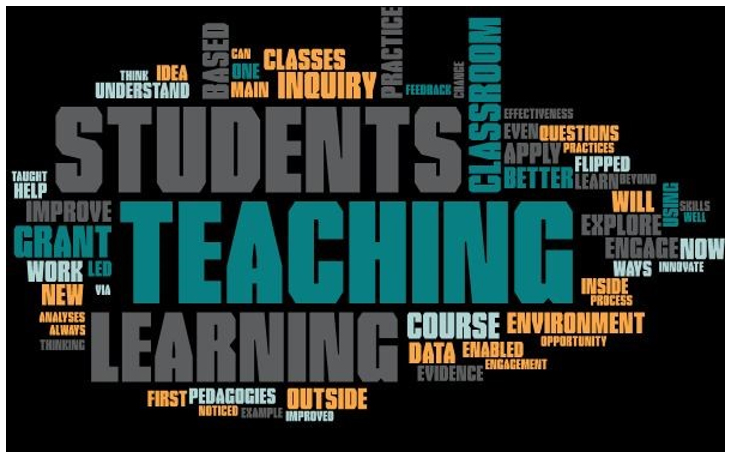We hope you’re enjoying the latter half of Semester 2 for AY2017/18! In our latest feature, we turn the spotlight on the Teaching Enhancement Grants (TEG), which present an opportunity for you to inquire further into your teaching practice.
The Teaching Enhancement Grants (TEG): 3 Reasons to Apply
The Teaching Enhancement Grants (TEG) were initiated in 2006 to encourage the enhancement of quality teaching. The TEG motivates teachers to interrogate aspects of their teaching, whether pedagogical approach, curriculum, programme, or assessment. Critical inquiry and reflection on these aspects will lead to informed decisions to improve student as well as faculty learning, and the student experience.
CDTLink asked 9 TEG recipients about 3 reasons why they applied for the grant. As illustrated in the word-cloud (see Figure 1), their responses centre on students, classroom-based inquiry, practice, evidence and data.
 Figure 1. Most frequently mentioned words by recipients on the reasons they apply for TEG.
Figure 1. Most frequently mentioned words by recipients on the reasons they apply for TEG.
The grant recipients shared what motivated them to embark on a TEG-funded teaching inquiry project and how it has made an impact on their students’ learning as well as their own practice.
Reason 1: “I want to know if my teaching practice improves student learning.”

![]()
“I wanted to improve my teaching practices and help students improve...their writing and ability to learn/apply taught classroom skills...My TEG on multimodal feedback enabled me to analyse data to better understand my students’ performance and engagement in learning…As a result, I have noticed improvements in my practice, as well as students’ work. I now understand the importance of closely guiding students as they learn. This, in turn, has led to improved student engagement, and a greater willingness to inquire and apply taught skills—both inside and outside the classroom.”
- Misty COOK, Centre for English Language Communication (CELC)
Reason 2: “I am curious if a new teaching idea I have will help students learn better.”

![]()
“I developed VisuAlgo, a visualization tool for my algorithm classes, which has led to a significant change in my teaching method. The...tool, just an idea 7 years ago, is now an active...website (https://visualgo.net/en)...which enables me to run flipped classrooms for my algorithm classes. It contains the 'basic lecture content', that…explains the basic idea about the algorithm that students can...learn at his/her own pace. During lecture/classes, I then engage students on the higher level applications of the discussed topic.”
- Steven HALIM, Computer Science

![]()
“I was excited...about the possibilities...presented by the TEG…which prompted me to...develop the augmented reality sandbox for experiential learning particularly in geography, geoscience and...natural science...I constructed and calibrated the augmented reality sandbox, probably the first used in Singapore to teach geography...and am currently developing tutorials to run lab sessions in a module on Singapore’s biophysical environment and handling spatial data. This research has changed my focus… my lab sessions are more focused on hands-on experience.”
- Muhammad Nawaz, Geography
Reason 3: “I want to apply an evidence-informed approach in my teaching.”

![]()
“The TEG...helped me to explore new pedagogies, mainly using standardised patients for teaching comprehensive assessment. The findings were impactful as the students had an authentic learning experience and it enhanced their competencies. This pedagogy was subsequently utilised by all nursing modules for teaching, and assessment. It provided me the impetus to have an inquiry mind and a willingness to explore new ways of doing things.”
- Lydia LAU, Alice Lee Centre for Nursing Studies (ALCN)

![]()
“TEG has changed my practice in 2 ways. First, I could develop teaching tools which directly impact my learning environment, such as an IVLE database of online questions, a key component of the flipped classrooms that I implement in some of my classes. The second and more profound changes to my teaching are more subtle and indirect. A TEG inquiry project forces you to shift towards evidence-based teaching, addressing questions like, “How will I know if this idea will work?” or “Has anyone else tried anything similar before?” During the TEG process, I had to constantly think about how to frame my intervention within the existing literature and evaluate its efficacy. The fact that I had to conduct a literature review and possible evaluation methods has made a deep impact on me as an educator.”
- Alberto CORRIAS, Biomedical Engineering

![]()
“I am a researcher at heart and it felt natural to me to bring this spirit into my teaching...to verify for myself what works and what does not using a scientific approach. I have published a book chapter with evidence that students’ perception is that they learn better with the methodology of my TEG grant, which was based on active learning.”
- Olivier Patrick LEFEBVRE, Civil & Environmental Engineering

![]()
"Our study measures the effectiveness of the module systematically and prospectively via a series of pre-course and post-course surveys..." [Read more...]
- Eric CHAN, Pharmacy, Sirinut SAWATDEENARUNAT & WU Siew Mei, CELC
If you are interested in getting funding for a teaching inquiry project, find out more here or contact Ms Doreen Thia at cdttyy@nus.edu.sg.


Okay, looks good.